The most read BBC News stories of the last decade
- Published
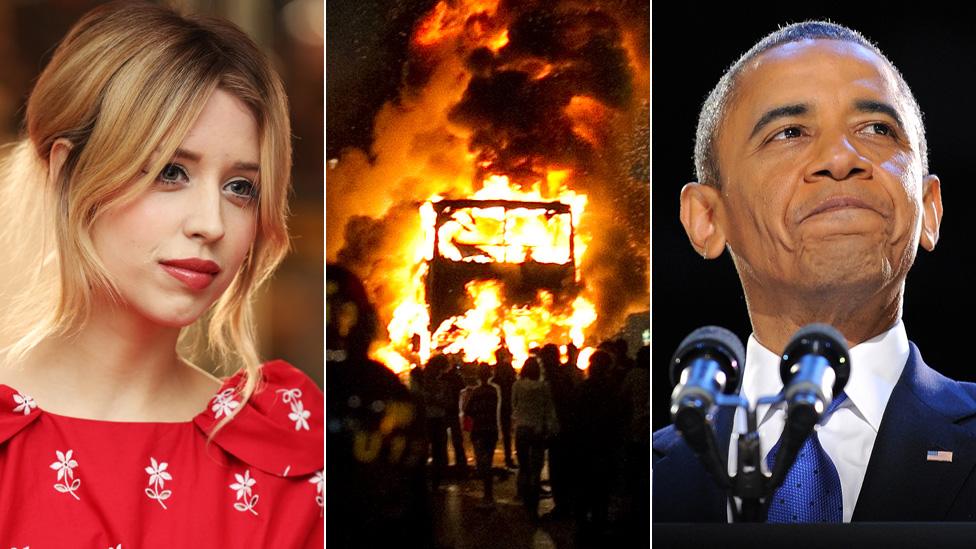
January 2010. Barack Obama was one year into his US presidency, Instagram hadn't been invented and the word Brexit had never been uttered.
A decade on, we look back at the most read stories on the BBC News website year by year.
2010: Chilean miners rescued
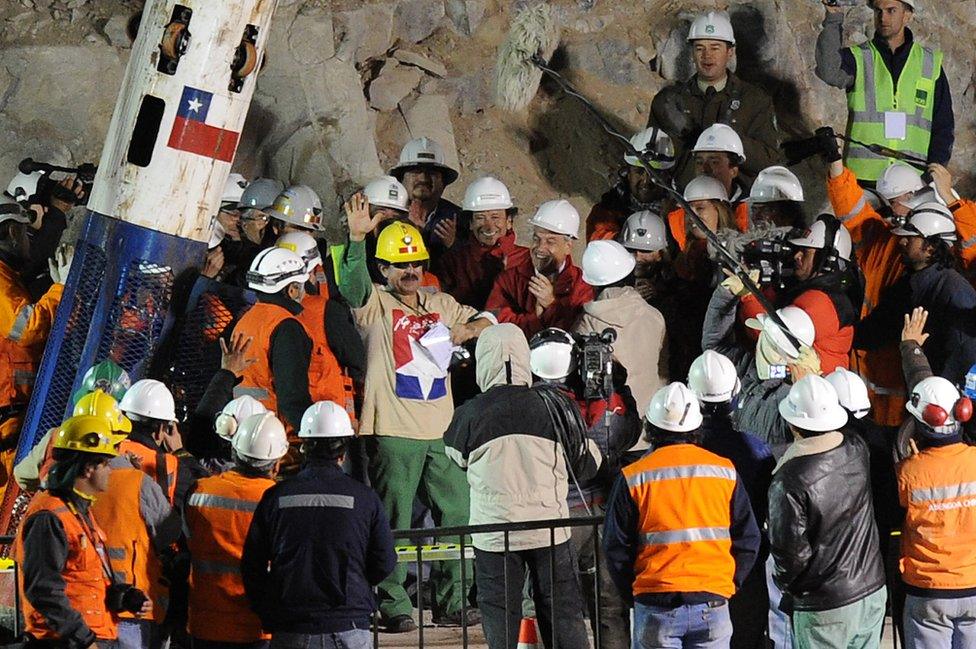
Miner Juan Illanes celebrates after coming out of the Phoenix capsule
Being trapped underground in darkness, with hardly any food or water, is "the stuff of nightmares", says BBC Latin America online editor Vanessa Buschschluter, who reported from the San Jose mine in northern Chile after 33 miners became trapped deep underground.
It was the nightmarish quality of the miners' situation, she says, that moved not only Chileans, but people around the world.
For 17 days the collapse of a Chilean copper and gold mine was not widely covered outside the country. That was until the miners tied a note to a probe sent deep beneath the ground saying they were alive.
And with that, "people were hooked", says Ms Buschschluter. Rescuers drilled down as the miners' desperate families watched on, keeping vigil from what became known as Camp Hope.
"When one of the drills finally reached the miners, the camp's bell rang out and relatives hugged and jumped for joy, some fell on their knees praying," Ms Buschschluter adds.
The 33 miners were brought to the surface one by one in a specially-designed capsule via a tunnel just wider than the men's shoulders. Winching them to safety took 22 hours.
People sang the national anthem and waved Chilean flags, as champagne corks popped. It was the stuff of movies - and sure enough their ordeal made it on to the big screen in a Hollywood film starring Antonio Banderas.
A story with a happy ending? Not quite. Many of the miners, who were trapped underground for a record 69 days, struggled to cope with their newfound fame, and some faced health and financial difficulties in the years after.
2011: Riots in England
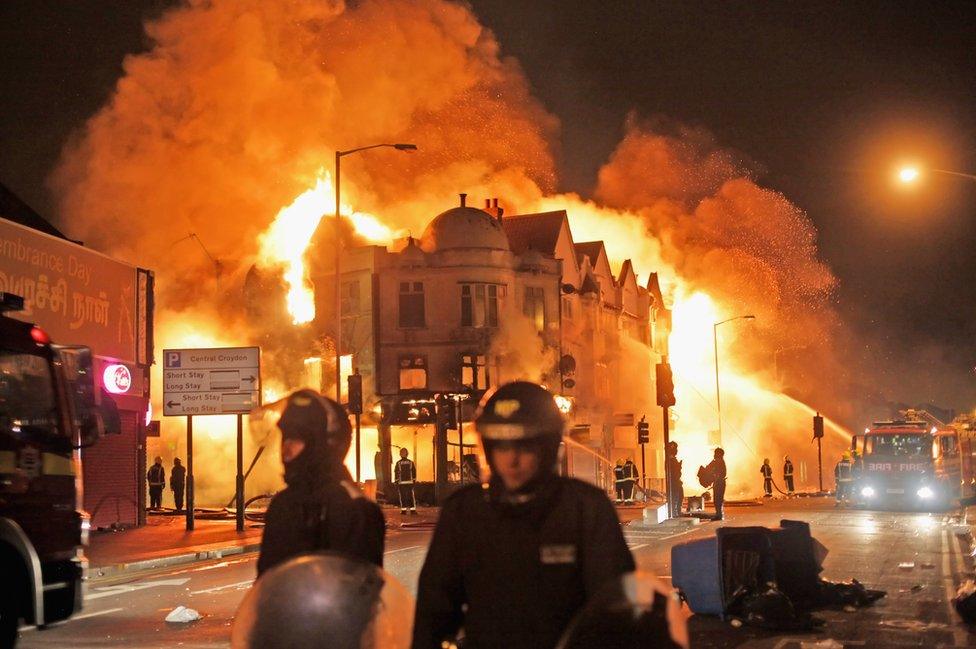
A 150-year-old furniture store in Croydon is sent up in flames
It was the worst case of civil unrest in the UK for a generation. The police shooting of 29-year-old Mark Duggan in Tottenham, north London, prompted a protest that turned violent.
Over four hot August nights, looters ran free and armed rioters set fire to two police cars, then a bus, and shops.
The unrest spread just like the flames - first across London, to Hackney, then Lewisham, Peckham, Woolwich, Ealing and Clapham - before erupting in other major cities including Manchester, Birmingham, Nottingham, Wolverhampton and Liverpool.
The Met Police officers later said they had been outnumbered and were afraid to take on rioters, some of whom were carrying machetes. Five people died and more than 3,000 were arrested.
In the year that followed, 1,400 of them were jailed and handed much tougher sentences than magistrates would usually give for such offences.
Research by sociologist Juta Kawalerowicz found deprivation and tensions between communities and police were main factors behind the riots.
The issue of police stop and search powers being used to target black people came up in the University of Oxford research. But Ms Kawalerowicz said they were not "race riots", and rioters did not come from one ethnic group.
2012: US re-elects Obama
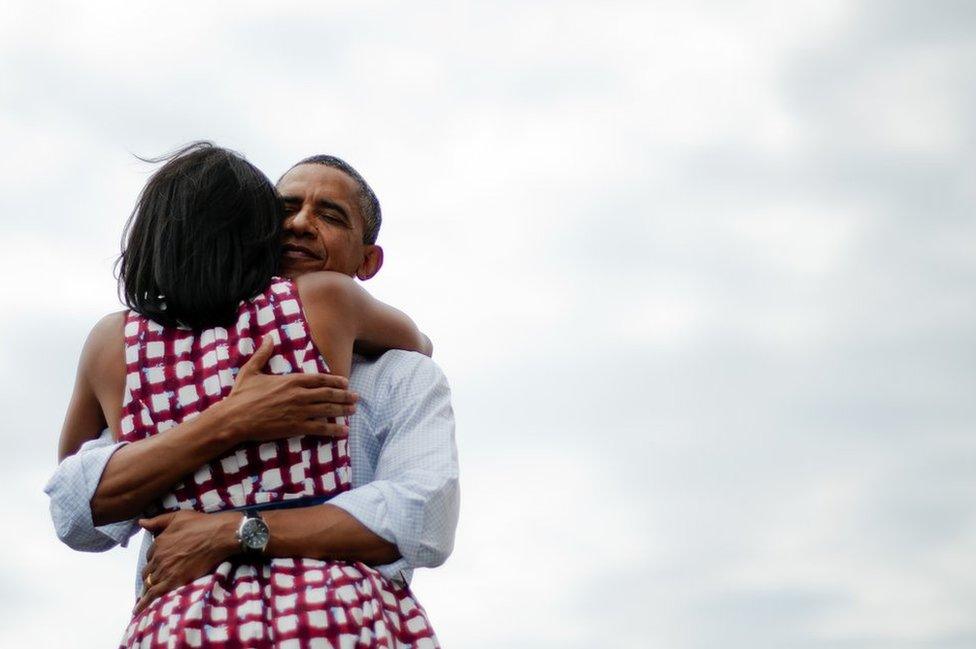
Michelle and Barack Obama hug in one of the most re-tweeted posts in social media history
The race was expected to be tight. But on election night, America's first black president stormed to another victory, securing a second term.
Barack Obama's re-election was particularly important, says our senior North America reporter Anthony Zurcher, because it proved US voters "were comfortable enough with a black man as president to want to keep him in the White House".
Mr Obama, a Democrat, had run a largely solid, professional campaign, painting his Republican opponent - Mitt Romney - as an elite, corporate executive who was out of touch with mainstream American voters, says our reporter.
In his first term, Mr Obama, who took office amid one of the worst recessions in decades, had overhauled the US healthcare system and overcome strong Republican opposition to pass a programme designed to boost the economy.
And in his first speech after re-election, Mr Obama told America: "The best is yet to come." He would go on to strike a climate change agreement in Paris, negotiate a deal to curb Iran's nuclear potential and restore diplomatic relations with Cuba.
But Mr Obama's second term was also punctuated by frustration, notably problems with his healthcare system and his failure to push through gun control legislation.
"Of course, four years later, Democrat Hillary Clinton was unable to rebuild Obama's winning coalition of young, minority and working class Americans," says Mr Zurcher.
2013: Boston bombings
The moment of the first explosion
A jubilant scene at the finish line of the 2013 Boston marathon turned into a horrific one when two pressure cooker bombs packed with nails, ball bearings and other shrapnel exploded.
Three spectators - including an eight-year-old boy - were killed, while 260 others suffered injuries, with many losing legs.
The US has had its share of terror attacks, but this one "transcended tragedy to become an ongoing national drama", says Mr Zurcher.
The search for the perpetrators shut down Boston for days. "It was a manhunt that played itself out on both traditional news outlets and social media, as Americans across the country watched every twist and turn with fear and fascination - the false alarms, dead-end leads and dramatic confrontations," he says.
Three days after the bombing, the FBI released CCTV images of the suspects, brothers Dzhokhar and Tamerlan Tsarnaev. Then a police officer responding to reports of a disturbance near the Massachusetts Institute of Technology campus was found with fatal gunshot wounds.
The brothers hijacked a car at gunpoint, and were chased by police, throwing explosives at them, before their car crashed.
The elder brother, Tamerlan, was killed in a gunfight that followed, but Dzhokhar fled on foot. The wounded 19-year-old was found hours later hiding in a boat in a local resident's backyard.
At a trial, his defence team argued his older brother was the driving force, but prosecutors said Dzhokhar was an equal partner. He was found guilty of 30 charges and sentenced to death.
Earlier this month, lawyers for Dzhokhar - who is currently in a high security prison - appealed against his death sentence, alleging jurors at his trial were biased.
2014: The death of Peaches Geldof
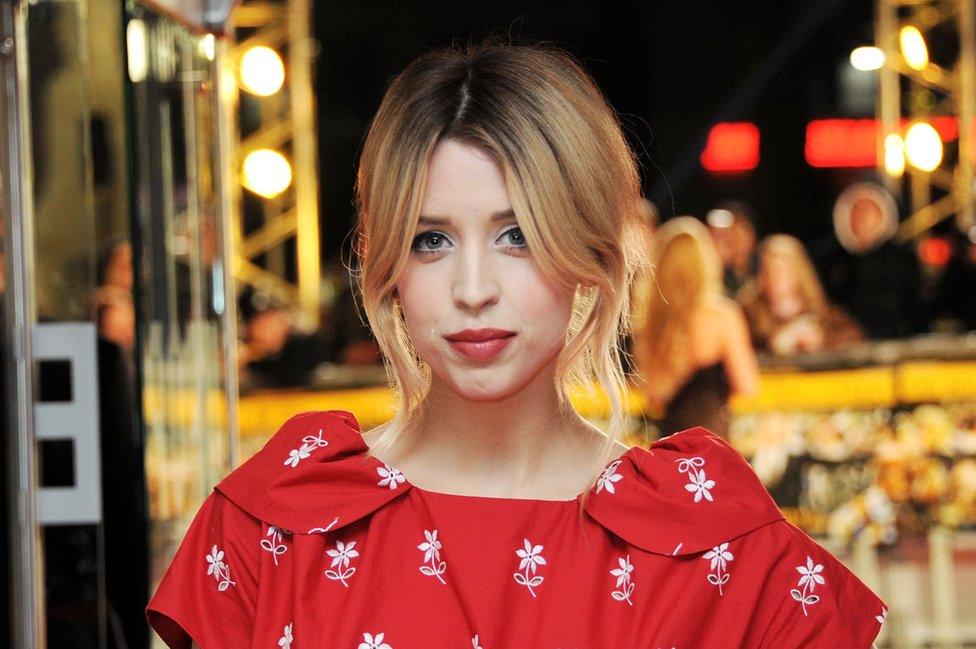
Peaches Geldof had started using heroin again before her death, an inquest heard
Peaches Geldof's death from a heroin overdose at just 25 shocked us all, says BBC senior entertainment reporter Mark Savage.
"Initial reports from the ambulance service called the tragedy 'unexplained and sudden' - immediately and eerily reminding us of the shocking death of Peaches' mother, Paula Yates," he adds. Geldof was just 11 when her mother died from a heroin overdose in 2000, aged 41.
The model and TV presenter - the second daughter of musician Bob Geldof - was a favourite of paparazzi photographers from a young age, often pictured leaving London parties in the early hours.
But later in life, she moved to the countryside with her second husband musician Tom Cohen and her two young sons, posting frequently about her family on social media. She told Mother and Baby magazine a month before her death that "becoming a mother was like becoming me, finally".
After Geldof died, messages of condolence poured into the BBC from readers.. An inquest heard she had been addicted to heroin and had been taking the substitute drug methadone for two-and-a-half years.
Her husband told the inquest Geldof had started using heroin again before her death. Detectives investigated who had given Geldof the heroin, but closed the case a year later with no answers.
2015: Paris attacks
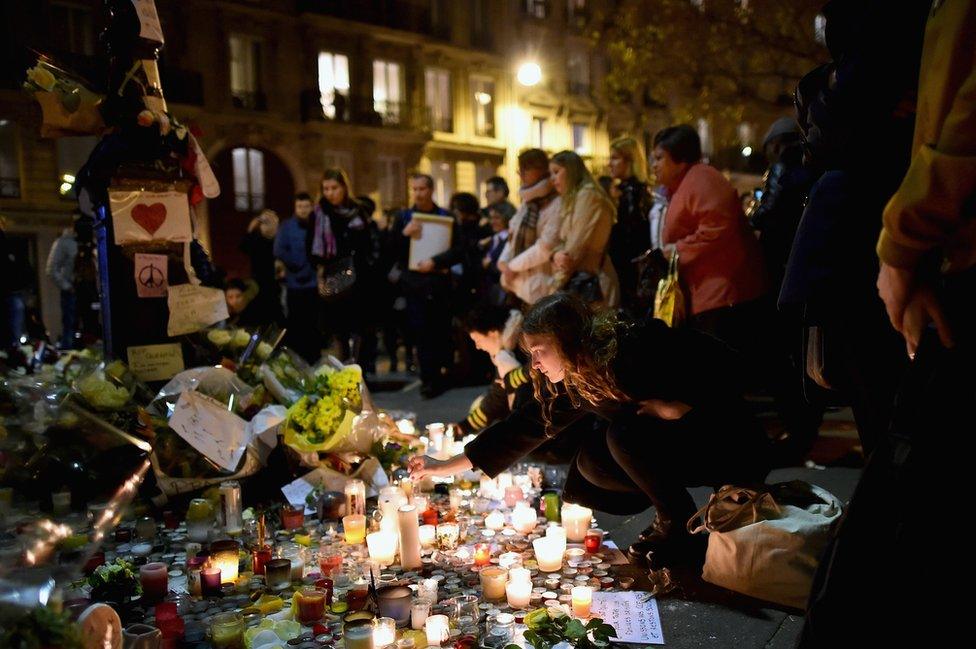
Gunmen stormed the Bataclan concert hall, firing at the crowds inside
Paris correspondent Lucy Williamson still remembers the sound of bullets ricocheting off the old facades of buildings in the city's 11th arrondissement on the night attackers killed 130 people and injured hundreds more.
Almost simultaneously, gunmen and suicide bombers attacked the Bataclan concert hall, the Stade de France stadium, as well as Parisian restaurants and bars.
It came in the middle of a string of attacks in France - 10 months after attacks on the offices of Charlie Hebdo magazine and nine months before the Nice lorry attack.
The suspected ringleader of the Paris killings was Abdelhamid Abaaoud, a Belgian national who was killed in a police raid in northern Paris five days later.
After months on the run, the sole surviving attacker, Salah Abdeslam, was shot and injured in a dramatic arrest in Brussels. He was later sentenced to 20 years in prison.
"For almost two years, it felt as if France was being bludgeoned again and again," says Ms Williamson.
But she says there was "something different" about the Paris attacks that means four years later "the impact lives on just below the surface".
"In the midst of attacks on satirical journalists, police officers, the Jewish community, priests, and symbols of the state, this time the hatred expanded to cover everyone - people at a concert, in restaurants, at a football game," she says.
"The target was simply France's joy in its own way of life."
2016: EU referendum
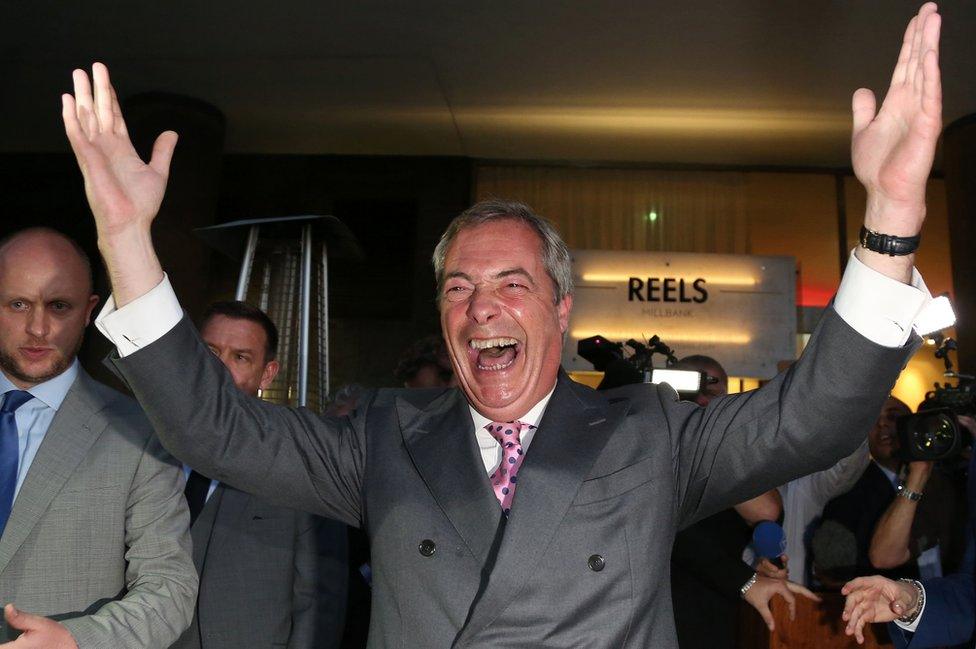
Nigel Farage reacts to the 2016 referendum result at a party in central London on 24 June 2016
BBC News' live coverage of the UK's 2016 EU referendum was, and still is, the site's most read page ever - by some distance.
It was to be the biggest decision "in our lifetimes", according to then prime minister, David Cameron, who urged the country to vote to stay in the EU.
The campaign that followed saw a "blizzard of claims, some of them of dubious provenance", says the BBC's Reality Check correspondent Chris Morris.
Across the side of a Vote Leave bus was the message: "We send the EU £350m a week, let's fund the NHS instead."
Mr Cameron and the Remainers were ultimately defeated by 52% to 48% - despite London, Scotland and Northern Ireland backing Remain.
Boris Johnson, the public face of Vote Leave, said voters had "searched in their hearts" and the UK now had a "glorious opportunity" to pass its own laws, set its own taxes and control its own borders. UKIP leader Nigel Farage hailed it the UK's "independence day". A day later, Mr Cameron quit.
Our correspondent says the referendum "created the current divide in British politics - a divide the latest election hasn't really resolved".
"We now know Brexit will happen," says Mr Morris. "But many of the bitter arguments surrounding it aren't going to go away."
2017: UK general election
Reaction from Bristol: 'You're joking. Why does she need to do it?'
"Not another one," was the cry from Brenda from Bristol, after Theresa May announced her intention to call a snap election. Coming after the EU referendum and the 2015 general election, people were tired of politics.
"In just three words, Brenda summed up the thoughts of so many millions of voters," says BBC presenter Jon Kay, who interviewed her. "With her lovely Bristolian accent and her old shopping trolley, we knew immediately that we had struck TV gold."
Mrs May said the election was needed for "certainty, stability and strong leadership" after the EU referendum - although, as we now know, she ended up losing her majority and having to rely on the Democratic Unionist Party to prop up her minority government.
The BBC's live coverage of the results was the most read page of the year.
In its first months, the government got its legislation through Parliament quite comfortably, but as Mrs May found to her cost, political deadlock was about to set in.
As for Brenda, Mr Kay still checks in with her from time to time. "She's doing fine but doesn't want any more fuss. She laughs about how mad the world is," he says.
Brenda doesn't own a laptop or a mobile phone. So when Mr Kay told her that her catchphrase had gone viral again after the 2019 election was called, she laughed and replied: "That doesn't sound very pleasant."
2018: Theresa May strikes a Brexit deal
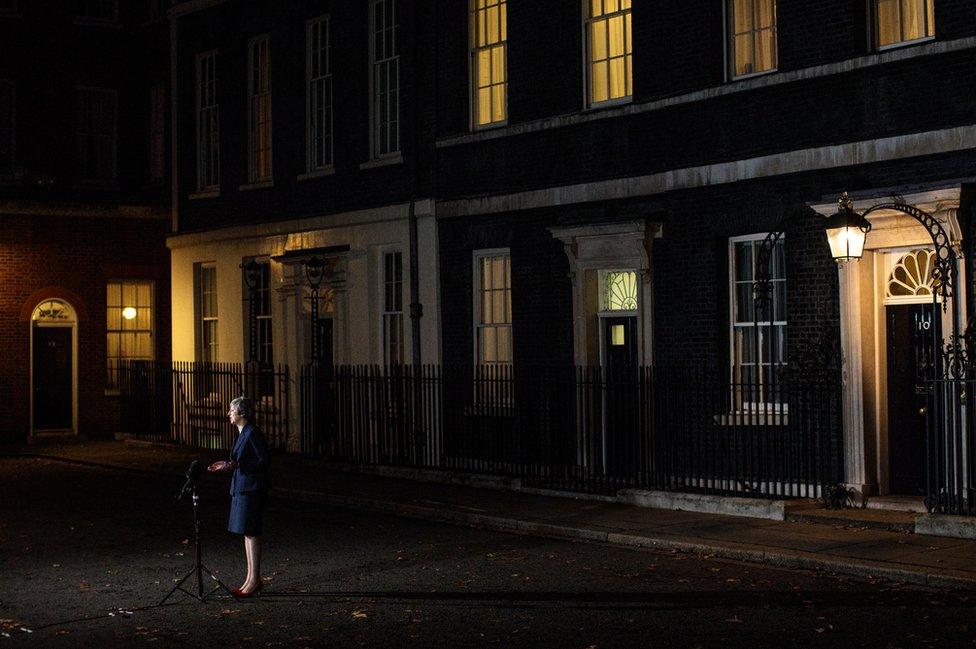
For a brief spell in November 2018, it looked as though the UK was headed for an orderly Brexit. But it didn't last long.
After years of negotiations, Theresa May finally struck a deal with EU leaders, setting out the terms on which the UK would leave the EU.
Mrs May said her cabinet had backed the deal, calling it "the best that could have been negotiated". But she soon faced a revolt.
Dominic Raab, then Brexit minister, led a wave of resignations, saying he could not "in good conscience" support the deal. In the following months, Mrs May faced votes of no confidence in her leadership, but she clung on.
However, after MPs rejected a version of her Brexit agreement for a third time, she stepped down, telling the country she deeply regretted being unable to deliver Brexit.
2019: General election
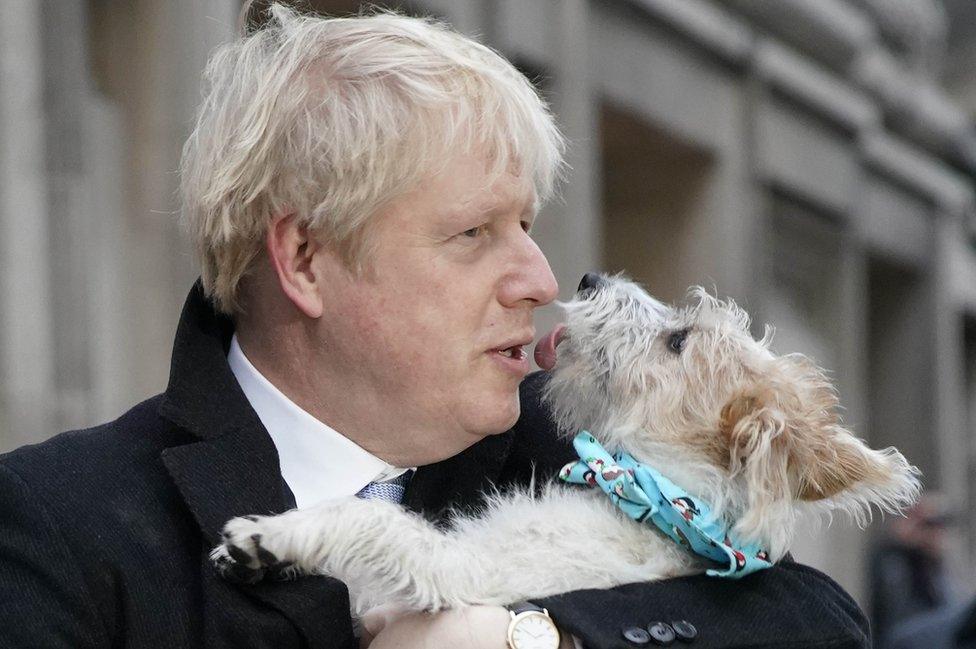
Boris Johnson outside his polling station with his dog, Dilyn
"Everything changed" on the stroke of 22:00 GMT on 12 December, says BBC political correspondent Jonathan Blake.
As the BBC's Huw Edwards declared the exit poll at the end of a cold and wet December polling day, the Conservatives were about to secure a Commons majority of 80, the party's largest since 1987.
"A campaign focussed relentlessly on the seemingly simple promise to 'get Brexit done' had won over voters in places long-seen as out of reach for the Conservatives," says Mr Blake.
The Labour Party had its worst election result since 1935, while the SNP made big gains across Scotland. In Northern Ireland, more nationalists than unionists won seats, putting the union further "under strain", says Mr Blake.
"But in Downing Street Mr Johnson's grip on power was stronger, his support-base wider and he now had a freer hand to do, within reason, what he wanted," he continued.
"The election result has set the course firmly for the UK's departure from the European Union, left Labour in ruins and all but silenced the arguments for another referendum."
Knife-edge votes and backroom deals between parties have defined the politics of the past decade. But after the Tory's resounding victory, the tone of the next 10 years could be entirely different.